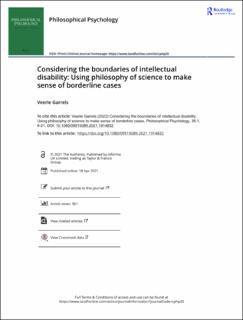| dc.contributor.author | Garrels, Veerle | |
| dc.date.accessioned | 2022-02-21T08:44:22Z | |
| dc.date.available | 2022-02-21T08:44:22Z | |
| dc.date.created | 2021-04-19T14:59:44Z | |
| dc.date.issued | 2021-04-18 | |
| dc.identifier.issn | 0951-5089 | |
| dc.identifier.issn | 1465-394X | |
| dc.identifier.uri | https://hdl.handle.net/11250/2980380 | |
| dc.description.abstract | Who should be diagnosed with intellectual disability and who should not? For borderline cases, the answer to this question may be as difficult to decide on as determining the borderline between being bald or not. While going bald may be upsetting to some, it is also an inevitable and relatively undramatic course of nature. In contrast, getting a diagnosis of intellectual disability is likely to have more far-reaching consequences. This makes the question of where the cutoff point for intellectual disability lies more imperative. Philosophy of science may help psychologists to understand the nature of this dilemma in a more profound manner. This article builds on the sorites paradox to explore the vagueness that surrounds the concept of intellectual disability and the consequences of this vagueness for the diagnostic process. While epistemicists argue that vagueness is a consequence of our limited knowledge of the world that we live in, semantic theorists claim that there is nothing that we do not know, but that our language allows for indecisiveness. What these different lines of understanding mean for psychologists who are diagnosing intellectual disability, is described in this article. Furthermore, the article discusses practical implications of these philosophical underpinnings. | en_US |
| dc.language.iso | eng | en_US |
| dc.publisher | Routledge | en_US |
| dc.relation.ispartofseries | Philosophical Psychology;Volume 35, 2022 - Issue 1 | |
| dc.rights | Attribution-NonCommercial-NoDerivatives 4.0 Internasjonal | * |
| dc.rights.uri | http://creativecommons.org/licenses/by-nc-nd/4.0/deed.no | * |
| dc.subject | Intellectual disability | en_US |
| dc.subject | Vagueness | en_US |
| dc.subject | Borderline cases | en_US |
| dc.subject | Sorites paradox | en_US |
| dc.subject | Philosophy of science | en_US |
| dc.title | Considering the boundaries of intellectual disability: Using philosophy of science to make sense of borderline cases | en_US |
| dc.type | Peer reviewed | en_US |
| dc.type | Journal article | en_US |
| dc.description.version | publishedVersion | en_US |
| dc.rights.holder | © 2021 The Author(s) | en_US |
| cristin.ispublished | true | |
| cristin.fulltext | original | |
| cristin.qualitycode | 2 | |
| dc.identifier.doi | https://doi.org/10.1080/09515089.2021.1914832 | |
| dc.identifier.cristin | 1905121 | |
| dc.source.journal | Philosophical Psychology | en_US |
| dc.source.volume | 35 | en_US |
| dc.source.issue | 1 | en_US |
| dc.source.pagenumber | 6-21 | en_US |

